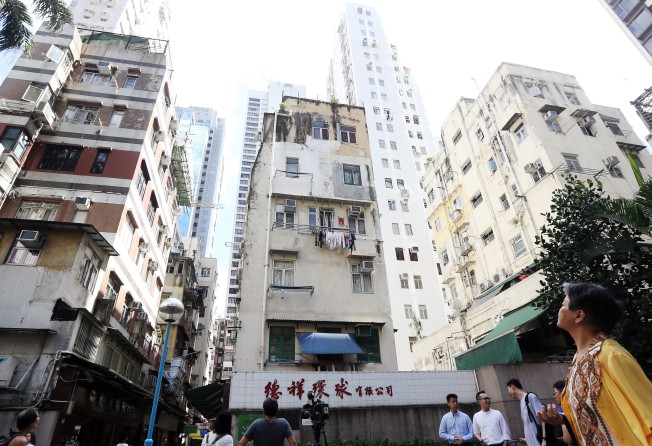Hong Kong’s Urban Renewal Authority makes record offer for buildings in Sai Ying Pun
Authority will pay HK$24,000 per square foot, but economist says property prices will be even higher after redevelopment

The Urban Renewal Authority (URA) has offered a record HK$24,000 per square foot to buy properties for a redevelopment project in Sai Ying Pun.
The acquisition offer, announced on Monday, came as private home prices in the world’s least affordable property market continued to rise for two straight years as of the end of March.
Economist Andy Kwan Cheuk-chiu said after the redevelopment, the properties would be valued at more than HK$30,000 per square foot.
The project, between Sung Hing Lane and Kwai Heung Street, will see 101 property owners benefit from the offer. They will have two months to accept. The offer, at HK$23,568 per square foot, means the authority will pay almost HK$12 million for a 500 sq ft flat. The URA said the offer was set by seven independent consultancy firms based on the price of flats in seven-year-old buildings in the same area. In November, developer New World’s Artisan House in the same area was asking HK$10 million for a 221 sq ft flat.
The project was authorised by the government in March and covers a total area of about 12,000 sq ft, involving 14 buildings.
The URA plans to redevelop the area into 89,000 sq ft of homes and 4,000 sq ft of commercial space. The project is expected to be completed by 2026 or 2027.
Kwan, director of think tank ACE Centre for Business and Economic Research, said the home prices after redevelopment would “no doubt” fetch more than HK$30,000 per square foot.
“It gives citizens an impression that such redevelopment projects will not be affordable,” he said. “It’s pointless and worthless, and completely of no public interest.”
Kwan said the authority, a quasi-public body enjoying a range of advantages such as the power of compulsory acquisition and exemption from paying the government a hefty sum to develop a site, should stop purchasing properties for redevelopment projects at the top of the market.
If the market continued to rise when the redevelopment project was completed, he said, the public would criticise the authority for riding the boom to make a profit instead of providing affordable housing. And if the market crashed, the public would criticise the URA for buying at the wrong time, he said.

“It’s a lose-lose situation,” Kwan said. “The URA will definitely lose whatever the scenario.”
Kwan said government-related bodies should refrain from urban renewal projects when prices were high, and should leave it to private developers, who would decide whether to buy and redevelop based on their own evaluations of the market.
In such a situation, he said, urban redevelopment would naturally slow down when prices were high as most developers would consider it unviable.
He said officials should subsidise property owners to maintain old buildings, and wait until prices came down to restart government-led redevelopment projects. Kwan said the authority should wait until prices dropped by about 40 per cent before committing to more redevelopment.